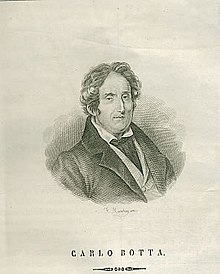Carlo Giuseppe Guglielmo Botta
Carlo Giuseppe Guglielmo Botta (born November 6, 1766 in San Giorgio Canavese ( Piedmont , Italy ), † August 10, 1837 in Paris ) was a French historian and politician of Italian origin.
Life
Carlo Giuseppe Guglielmo Botta graduated from the University of Turin with a degree in medicine in 1786 at the age of about 20. He zealously advocated the maxims of the French Revolution and was imprisoned for more than a year in May 1794 as an alleged conspirator. After his release in September 1795, he went to France and in 1796 became a field doctor in the Alpine Army there. As a military doctor he took part in the campaign of Napoleon Bonaparte, whom he admired at the beginning, against Italy and in 1797 the expedition to Corfu , from which he returned to Italy in 1798. In December 1798 he was appointed by Barthélemy-Catherine Joubert as a member of the provisional Italian-French government of Piedmont. In April 1799, however, Piedmont came briefly to France.
When an Austro-Russian army invaded Italy in June 1799 and drove out the French troops, Botta fled to France again and worked as a military doctor in Grenoble . On June 9, 1800, he married Antoinette Vierville and had three sons with her. After the battle of Marengo, which was victorious for Napoleon (June 14, 1800), Botta became a member of the Consulta and then from October 1800 to April 1801 a member of the Piedmont Executive Committee. This country was united with France in September 1802. Botta then lived in Paris and was from 1804 and a second term from 1809 a member of the Doire department in the French legislative assembly, to whose vice-president he was elected in 1808. However, he criticized Napoleon's style of government as despotic, therefore attracted his disapproval and in 1814 voted for Napoleon's dismissal. Now his political career ended. For fear of persecution in his homeland, he took French citizenship on February 25, 1815.
In 1815, during Napoleon's return to power for a hundred days, Botta was rector of the University of Nancy . Under the Bourbon ruler Louis XVIII. he held the post of rector of the University of Rouen from 1817 , but was dismissed in 1822 due to clerical influence. Then he withdrew into private life. After his patron Karl Albert became King of Sardinia in 1831, he received from him an annual pension of 4000 lire and permission to visit his homeland Piedmont again, where he was staying in September / October 1832. He then returned to Paris and died here in 1837 at the age of 70. His remains were transferred to the Santa Croce Church in Florence in 1875 .
Botta wrote several rather uncritical historical works, including a description of the American Revolution that was very well received in the United States in 1809 and a work on the history of Italy from 1789 to 1814 in 1824. This was followed in 1832 by a history of Italy covering the period between 1534 and 1789 which in turn continued Francesco Guicciardini's book on the same subject , which reached from 1490 to 1534. The last three works mentioned were published together as Storia d'Italia dal 1490 al 1814 (Paris 1832, 20 volumes). In 1824 he became a member of the Accademia della Crusca in Florence .
Paul-Émile Botta , a son of Carlo Giuseppe Guglielmo Botta, was an important archaeologist who, among other things, uncovered a Neo-Assyrian palace in Chorsabad during excavations in 1843/44 .
Works
- Storia naturale e medica dell'isola di Corfù (Milan 1798)
- Souvenirs d'un voyage en Dalmatie (Turin 1802)
- Précis historique de la Maison de Savoie et du Pièmont (Paris 1802)
- Storia della guerra d'indipendenza degli Stati Uniti d'America (Paris 1809, 4 volumes; English edition History of the War of the Independence of the United States of America , Philadelphia 1820–1821)
- Il Camillo o Veio conquistato (Paris 1815), epic in 12 songs
- Storia d'Italia dal 1789 al 1814 (Paris 1824, 4 volumes; German edition by Förster, Quedlinburg 1827–1831, 8 volumes)
- Histoire des peuples d'Italie (Paris 1825, 3 volumes)
- Storia d'Italia continuata da quella del Guicciardini dal 1534 sino al 1789 (Paris 1832, 10 volumes)
literature
- Giuseppe Talamo: BOTTA, Carlo. In: Alberto M. Ghisalberti (Ed.): Dizionario Biografico degli Italiani (DBI). Volume 13: Borremans – Brancazolo. Istituto della Enciclopedia Italiana, Rome 1971.
- Botta, Carlo Giuseppe Guglielmo , in: Pierers Universallexikon , 4th edition, 3rd volume (1857), p. 132 ( digitized version )
- Botta, Carlo Giuseppe Guglielmo , in: Meyers Konversationslexikon , 4th edition, 1885–1892, 3rd volume, p. 266 ( digitized version )
Web links
- Botta, Carlo Giuseppe Guglielmo . In: Encyclopædia Britannica . 11th edition. tape 4 : Bishārīn - Calgary . London 1910 (English, full text [ Wikisource ]).
Individual evidence
| personal data | |
|---|---|
| SURNAME | Botta, Carlo Giuseppe Guglielmo |
| BRIEF DESCRIPTION | French historian and politician |
| DATE OF BIRTH | November 6, 1766 |
| PLACE OF BIRTH | San Giorgio Canavese , Piedmont , Italy |
| DATE OF DEATH | August 10, 1837 |
| Place of death | Paris |
